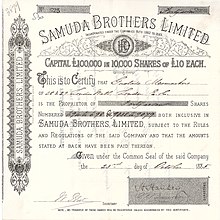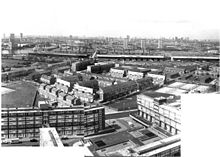Samuda Brothers
Samuda Brothers was a shipbuilding and engineering company based in Cubitt Town on the Isle of Dogs in London .
history
The two engineers Jacob Samuda and Joseph d'Aguilar Samuda were Sephardic Jews whose family settled in London around the beginning of the 18th century. Born in 1811, Jacob first trained with the engineer John Hague , his brother Joseph, who was two years younger than him, first learned in his father's company before he followed his brother. After completing their apprenticeship, both began to work on their own in general and marine engineering. In 1839, after previous attempts, they patented the Atmospheric Railway , the principles of which Joseph summarized in his book A Treatise on the Adaptation of Atmospheric Pressure to the Purposes of Locomotion on Railways .
In 1843 both founded the Samuda Brothers iron shipyard in Orchard Place. On November 12, 1844, Jacob and six other people were killed in an explosion during the test drive of the iron steamer Gypsy Queen , which they built and which had received a new type of steam engine based on patents from Jacob Samuda.
The shipyard developed rapidly in the following years and in 1852 moved to a larger shipyard in Cubitt Town. Another ten years later, the yard delivered twice as many ships as all other London shipyards put together. Iron cargo and passenger steamers, steam yachts and barges as well as warships were built. Many foreign navies ordered ironclad ships from Samuda Brothers, which ensured their survival during the financial crisis triggered by the collapse of the London banking house Overend, Gurney and Co. in 1866.
Joseph Samuda was one of the co-founders of the Royal Institution of Naval Architects in 1860 , as its treasurer and vice-president he later worked and a little later also a member of the Institution of Civil Engineers . After years of working for the London Metropolitan Board of Works , he began a parliamentary career that lasted until 1880. He later converted to the Christian faith.
In 1877, the future Japanese admiral Tōgō Heihachirō gained shipbuilding experience at the shipyard and supervised the construction of the Japanese ironclad Fusō .
After the death of Joseph Samuda in 1885, unsuccessful attempts were made to sell the shipyard as an ongoing operation, whereupon the operation was closed in 1890 and the inventory was auctioned off in a multi-day auction. The wood processing and vulcanizing company Haskin Wood Vulcanizing Company settled on the site of the former Millward shipyard . The Samuda Estate residential and business district has been located on the site of the former shipyard since 1965 .
literature
- Ian McNeil: An Encyclopedia of the History of Technology . Taylor & Francis, London 1990, ISBN 0-415-01306-2 .


